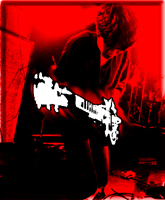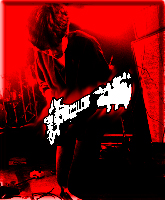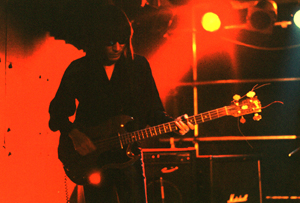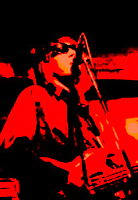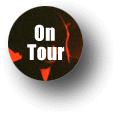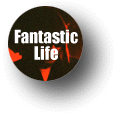

|
"Since the early 80s, bassist/singer Asahito Nanjo, seizure-guitarist Munehiro Narita and various drummers have been exploring the outer limits of chaotic heaviness and roaring velocity. The band is loosely identifiable as psychedelic punk, but their bombastic, distorted rush is smarter and more substantial, full of darkness, corrosion and unstable energy."- New York Press With all due respect to Motorhead and the Dead C, the Japanese band High Rise is the world's greatest extant hard rock band. In existence with its two principle members (bassist/vocalist Asahito Nanjo and guitarist Munehiro Narita) since 1986, the band is a ferocious mixture of Blue Cheer's spiky speedrock and the extended live workouts of Cream. Due to job and family commitments in Japan, the band members' ability to tour has been extremely limited, and it wasn't until October of 1998 that they made their initial foray to U.S. shores on a tour that encompassed a grand total of four performances (San Jose, Chicago, New York and Philadelphia). Thus, their announcement of a March 2000 tour was greeted with cheers from all corners. As their American label head, the responsibility of arranging the tour fell to me, and as I was also in need of a 'vacation', I volunteered to drive during the east coast portion of the journey. It was only a small step more to take notes and document the whole affair. Boston, March 12 Boston is the third show of the tour, after appearances in Seattle and Minneapolis. The band's schedule is brutal (a show every day for 9 days straight, with plenty of plane flights in between), but Narita's job as a fund manager in Japan restricts his ability to travel, and this time frame is all they can spare for a tour until who knows when. The band flew into Seattle on Friday March 10, and their show that night at I-Spy with Kinski was a rousing success, with close to 350 people in attendance. The next night's show in Minneapolis was hampered by a concurrent Flaming Lips show (in a discouraging trend for rock music in general, the Lips show at the 7th St. Entry actually began at 6 p.m., and was over by 10 p.m. so that the club could clear out and set up for a 'techno dance night' later in the evening...). Despite all the potential distractions, the High Rise show, by all accounts was a good one, and best of all, no missed flights, no lost luggage and no disasters (so far, anyway). Boston's Logan Airport looks great on the map (it appears to rest so snugly on its perfectly shaped outcropping in the Boston harbor), but is a disaster in person. At least the roads leading to Logan are disastrous; narrow, ill-marked tentacles that twist and turn through the city's North End. During the trip to the airport I actually fantasize about other cities' isolated suburban airports with their wide access roads. However, once through the gauntlet that is Boston traffic, Logan turns out to be no problem. The weather has been the only downfall to the early stages of the trip; 33 degrees and pouring down rain. But on this evening, it's merely cold with a slight drizzle, so loading in and out won't be a total disaster. The band is in good spirits upon their disembarkation, and I'm pleased to discover that Koji Shimura, their traveling companion from their last tour (and an employee of the Modern Music record store in Japan, the home-base for P.S.F., their Japanese record label) is their current drummer. Nanjo is also traveling with his girlfriend Nana, so we are a party of five. The band members turn more than a few heads with their attire, which while not exceptionally outlandish, pretty much screams 'rocknroll band'. All three band members are dressed head-to-toe in black, and Narita and Nanjo both sport leather motorcycle pants. Nanjo's hair hangs down in long, black strands, and his purposeful stride and nicotine-stained grin give him an impressive air despite his diminutive stature. Narita and Shimura are both restrained in comparison; they speak infrequently, and then with an air of wizened sagacity. Shimura, being the drummer, also has an endearing goofiness. Japanese guys dressed like this in an American airport make most people pretty curious. While I would bet all the money I have that nobody in the Boston airport could have positively I.D.'d the band, anybody who saw them knew they were somebody. The mistaken first impression is that High Rise have difficulty understanding English (and thus, by American definition, are a bunch of idiots) due to the fact that their verbal English is rather halting. In fact, the opposite is true. They understand English exceptionally well, and their knowledge of American cultural history outstrips the majority of natives. Of course, I didn't always realize this, and it took me a good bit of time (basically, the entire first U.S. tour) to figure out that I didn't have to shout at them or treat them like children to communicate. They are perfectly capable of taking care of themselves when traveling abroad, to be sure. No trouble getting to the club through the maze of Cambridge, and we arrive at the backdoor at roughly the same time as the Major Stars and Abunai!, the stage companions for the evening. The Major Stars are the latest incarnation of the Wayne Rogers/Kate Biggar rock armada, and they are loaning equipment and joining High Rise for the entire east coast leg of the tour. This first night is an acid test of compatibility, both instrumentally and socially. Luckily, Rogers and Biggar are the most affable of psychedelic warriors. The duo have a long history in the indie rock scene, from the Crystallized Movements to Magic Hour, and they've operated the Twisted Village label and store for more than a decade so they've seen most everything (the diary of their U.S. tour with the Japanese band Ghost was partly the inspiration for this diatribe). In pre-tour conversations, Biggar's only concern was that the members of High Rise might find the Major Stars amplifiers to be a bit 'too small'. I assured her that I had seen the Major Stars play, and that their amplifiers were capable of whipping up a pretty voluminous roar, but wouldn't you know it, the amps were immediately a subject of concern among the High Rise members. Size does matter, at least when amplifiers are the subject, but High Rise soon determine that the gear is more than adequate by subjecting us to an ear-bleeding soundcheck. Still, everything's happening in a rush. Straight from the airport to the club, and then almost straight on stage for a soundcheck. No time for a real sit-down meal, so Shimura and I head to McDonald's across the street, and I later pick up some take-out Chinese food for Nanjo. (In so many ways he is a man who knows exactly what he wants, and what he wants to eat he will eat during the entire trip: fried fish, shrimp fried rice or canned ham.) The hectic pace isn't especially conducive to a great show. The Middle East downstairs is a cavernous place with a capacity of 575, and it can seem empty even when half-full. It's also a prime example of the 'paid professional' side of the indie rock circuit. Just like the old 9:30 club in DC, the Middle East is populated by guys (and gals) who have seen it all and aren't afraid to advertise it. Plus, there's the special Boston spin on the rock-club employee; tattoos, Misfits tee-shirts AND pork-pie hats. This Sunday evening, the downstairs seems especially inhospitable. While there is a decent turnout of over 100 people, the sound gets lost in the subterranean rafters. The band seems off its game, breaking a bass string (!) and generally not being as 'on' as I've seen in the past. Nanjo later states that this was a "20% High Rise show". I'm sure that the group will regain their momentum in the next few days, but it's still a bit of a let-down on my first night with them. Luckily, we've got a decent place to stay with Joe, the drummer for Abunai! Abunai! write lovely, melodic proto-psychedelic tunes, and play them with all the manic energy and geeky good cheer of the fully, newly committed. They look as if they may have wandered out of the fields of Glastonbury '73, but irregardless of their gnome-ish countenances (or perhaps because of it) there's a subtlety to their work that the majority of contemporary psych bands fail to comprehend. Despite the mellowness of the High Rise performance, there's a positive vibe all around, and we're soon on our way to Joe's place to bunk up. Joe is currently 'between situations', but it's apparent that his previous jobs left him in pretty good stead. He's a gracious host, and we're able to linger over the paper and coffee the next morning, with one exception: he has a none-too-pleasant meeting with his ex-wife scheduled. With obvious relief he's able to delay the encounter, then returns to his daily routine; a dervish-like whirl between dully glowing computer monitors, servers, email programs and the like. We finally get out into the streets for a series of misadventures in the tourist trade. First, we're foiled at a graveyard purporting a 360 degree view of the city (closed for the winter? Since when are dead people 'closed'?), then burdened by an overly lengthy journey for a guitar store. We muddle our way through the preliminaries and head for the main course; Harvard Square for lunch and a visit to Twisted Village. Figuring out where to eat is always a challenge (largely due to Nanjo's gastrointestinal particularities), but we're eventually sated and ready to shop. The band is enthused about the store, and Narita exits with a couple of CD's by the Michigan '60s psych band the Litter, Shimura buys up the entire Lee Hazlewood catalog, and Nanjo purchases vintage CD reissues that I would characterize as 'underground' even by underground standards. I already knew from interviews that Nanjo is blessed with an encyclopedic knowledge of classic rock, but he is equally at home discussing all manner of jazz as well as film. Damon and Naomi happen to be visiting the store at the time, and they congratulate the band in Japanese on their successful performance of the night before. After almost losing Nanjo in a grocery store, we all climb in the van for the trip west to Easthampton. Easthampton, March 13 The drive to Easthampton takes place with little fanfare. The beautiful mountainous terrain of western Massachusetts reminds me of home in Blacksburg, but the desolate 'downtown' of Easthampton has a more depressingly Appalachian ring. The area surrounding Easthampton is known as the "five college area" (Amherst, UMASS, Smith, Hampshire and Mount Holyoke), so you can generally count on a decent turnout of students at Flywheel, the night's venue, even though Easthampton itself doesn't actually host a university. However, we happened into town during spring break (a fact that I luckily did not learn of until we arrived at the venue), so there was some apprehension as to what sort of turnout we might expect that evening. Flywheel is an artspace rather than a bar, and from the looks of it, they've made a tremendous effort to create a community space that actually seems to have a community attached to it. When we arrive in the late afternoon, we find a curious mixture of people, ranging in age from 15 year old mohawk punks to middle-aged relics. Nanjo jokes that we will have to pass the hat, but I've got a premonition that all will go well. However, things don't go so well on our drive over to the hipster town of Northampton. We almost get in a pedestrian/vehicle 'mishap', then find that a promising record store, Dynamite, closes at 6 p.m. (for the record, I could never live in a town whose record store closed at 6 p.m.). The only bookstore we see turns out to be new age-y with heavy perfume in the air (and no bargains), and Northampton is looking pretty uninviting and time's a-wastin'. As we head back to the van we pass a drugstore, and suddenly the entire Japanese contingent takes an immediate detour, eyes wide. 'Japanese love discount stores' Shimura helpfully explains, as I check my watch and count the cans of Vienna sausages happily shoved into little plastic bags. Back to Easthampton, and the dinner issue rears its fried-fish encrusted head. The place next door to the club is unfortunately closed, so we're sent off into the hinterlands with no guide. The Chinese place is closed, Subway is a last resort, a so-called fish restaurant has no customers and looks sketchy. We finally settle on the slowest Italian restaurant in the universe, and enter a David Lynchian landscape inhabited by "waitresses" and "food". After a near-eternity, we rush back to the club only to discover that we've missed Frost Giant, nutty western Massachusetts guys doing their take on Krautrock (one member, Chris, works at Byron Coley's Ecstatic Yod Mill Outlet record store). People are streaming into a jammed Flywheel while we set up our table of merchandise in the lobby by the front door. It's a little difficult to wend our way through the crowd, but it's even sillier for the bands. There's not even a raised stage at Flywheel; the bands just set up on the floor and go at it. Eventually there're so many people packed into the room (over 120) that it doesn't really matter. Everybody can feel it. In the lobby we can't see a thing, but we can feel (and hear) plenty well, thank you very much. The Major Stars, being relatively local heroes, get an enthusiastic greeting and rip through a very satisfying set. High Rise comes on and just smokes the crowd. Narita's eyes are rolling up into the back of his head, and sweat is flying off of his contorting body. The crowd is going nuts, and people are actually dancing; not just the usual headbanger, devil-horns-in-the-air gimcrackery, but real live movement. It's an incredible catharsis for both the band and the audience. High Rise, after their tentative show the night before, unload huge, viscous blobs of pure rock power on the crowd, and the audience soaks it all up with an ecstatic glee, astutely knowing in-the-moment that they're experiencing history in their small, isolated space in their small, isolated town. Incredible. Our evening's lodging is with a rather "spiritual" gentleman named Atendrya (a name given to him by his yoga teacher), in his rustic, but plenty spacious, place just across the street from the club. A.T. (as he likes to call himself) appears roughly forty or so, and speaks in a wide-eyed mixture of parables and self-empowerment-speak that is so earnest I want to cry. There are hints that his history has some potentially interesting twists, but I'm a little too tired to be fully interested, and I'm more concerned that he doesn't confuse the High Rise guys with his overzealous attempts to be gracious. He did shoot some excellent video of the show (video that will no doubt appear on Nanjo's La Musica label in the near future as High Rise USA Tour Volume 1), and we stay up late checking it out. In the morning A.T. cooks up some blueberry pancakes and I end up as his conversation companion while the members of High Rise have a band meeting. I'm never quite sure what to make of these meetings due to my complete inability to translate Japanese. It's a beautiful language, but it's also full of exclamations and hard vocal sounds (Nanjo is especially expressive in this regard), and it's tough for me to get an idea of even the general tone of a discussion. I imagine that these guys are heavy into arguing during these meetings, especially after the volcanic outbursts I witnessed during their last US tour with drummer Shoji Hano. Eventually we've got a belly full of cakes and a fond farewell under our belts, and we're off to New York City.
We turn on the TV and find CNBC, with the latest financial news, which Narita is instinctively drawn to. The yen is taking a beating against the dollar, which will hurt these guys on their return to Japan. In retrospect, this week is actually a transcendent moment in U.S. economic history, as the stock market's volatility is just beginning to affect the new economy companies, signaling the end of the honeymoon. Narita tells me that if he gets a promotion at his workplace he won't have time to go on tour with High Rise anymore, and any possibility of High Rise coming to America would effectively end. He suspects it will happen within the next five years, and there's no doubt which option he'll take. The life of a Japanese salaryman always sounds murderous to Americans grown fat on their own ease, but a Japanese businessman's life looks easy compared to the hardships of trying to make it as a professional musician in the underground economy, especially when you're one of the visionaries operating on the fringe. Guys like Roky Erickson or Alex Chilton or Moondog or Albert Ayler (or hell, most of the Squealer Music and Twisted Village roster) probably never made (or will make) enough money in their lives to be able to get off the treadmill. If you're fried enough to become a legend, but jinxed just enough to never get the brass ring, it might be a blessing if you can exit a la Johnny Otis or Brian Jones. Great rocknroll was never made by careerists. Which is one reason Narita is such a curious character. It's hard to reconcile his manic guitar playing with his double life as a fund manager. He seems a rarity even amongst musicians who are able to juggle music and the straight life. Rarely has anyone been able to make music as forceful and uncompromising as High Rise without fully committing themselves to all the things, both positive and negative, that come with the territory. The tightrope that Narita walks seems an exceedingly narrow and precarious one. In any event, after a couple of hours of leisure, it's off to Tonic, currently one of NYC's best venues. The club's bookings got jump-started a couple of years ago when John Zorn phoned them looking for an alternative venue for a summer music series. Prior to the call, the club had been struggling with no clearly defined sense of purpose, but now they've acquired a cachet that makes it the venue of choice for everyone from Keiji Haino to DJ Olive to Ken Vandermark to, ummm, Ondar, the master throat-singer. The perfect place for High Rise. We hook up with our friend Jordan Mamone prior to the show, who's the catalyst for the addition of Paska on this evening's bill, an addition to which we all feel a little apprehension. Paska is a Finlander, apparently a controversial radio figure over there similar to Howard Stern, who performs red-faced karaoke versions of ridiculous songs such as "Stairway to Heaven" and "Like a Virgin" in fifteen minute bursts of anarchic intensity and humor, shirtless and intoxicated and with all the subtlety of a football hooligan after a bad loss. Needless to say, his American Q-rating is practically zero, but our fears are ultimately unfounded, as Paska (or Ari, which is his real name. Paska means "shit" in Finnish) turns out to be quite a charmer, and his opening slot performance is violently funny. His presence helps contribute to the sense of event surrounding the show. The advance press has been ecstatic, and the club is completely sold out, with crowds turned away at the door. In the lobby, ticketless fans jockey for position to catch a glimpse of the show inside, while the crowd spills out the door onto the desolate stretch of Norfolk Street upon which Tonic sits. The red velvet curtains of Tonic's stage only hint at the heat being generated below, with both the Major Stars and High Rise playing hot and proud, but I'm in the lobby with the sideshow of industry hotshots and rock cognoscenti, and a merchandise table that's constantly overrun, and I miss most of the action happening on stage. Still, I can tell by the happiness on everybody's face that the show has been a big success in every way. Nanjo rounds off the evening back in Brooklyn by passing the canned ham around for all to take a glorious, triumphant forkful.
Philadelphia March 15 The next day in New York is a casual one; record shopping (all of us) and selling (Nanjo, with a huge bag of his La Musica rarities to the downtown stores). We finally get out of the city around 3 p.m., but we're dangerously low on gas and pull into the first New Jersey rest stop on the Turnpike, only to find the longest waiting lines I've seen since the energy crisis of '73. Miraculously, we also encounter the Major Stars at the same rest stop, so we ask them to pass the word along that we'll be late arriving at the Philly gig.. Of course, this being Philadelphia, we shouldn't have been in any hurry to get there. When we finally pull up at the club around 10 we find things are moving along at a snail's pace. The Khyber is an oddly-shaped place near the revitalized waterfront of Penn's Landing. The area is full of little restaurants, and I imagine that it's pretty jumping on the weekend, but it's relatively sedate outside on this Wednesday night as we stand around waiting for everybody to get their shit together. They love to pack bills in Philly; besides High Rise and the Major Stars, tonight's lineup includes the Bardo Pond offshoot Prairie Dog Flesh, another band called Naradhama, and yet another band that features the club's booker, Tyler. Five bands seems a little extreme, especially for a Wednesday night and especially when the first band doesn't go on until after 11 p.m., but Philly rock fans seem to know what to expect, as the club is pretty empty until 11, but then fills up rapidly. I suspect that on any other night I'd be enthusiastic about this army of rock, but in the cramped quarters of the Khyber, with plane flights in the morning, I'm just anxious for it all to end. Still, the show was a good one. Naradhama is a one-man electronics army, with a semi-circle of effects pedals surrounding the satanic operator in the center. Prairie Dog Flesh might as well be Bardo Pond (the membership of both bands is exactly the same), though it may open up their "channels" to perform under a different name. If anything, P.D.F. take the Bardo rattle and hum to even more far out extremes. The Major Stars play perhaps their best show of the tour, and when High Rise finally finish up at around 2:30 a.m., Nanjo staggers off the stage in exhaustion, muttering 'no encore' over and over as he crawls into a chair, completely spent. I keep getting all manner of omens that things aren't quite right, but then again, it could just be Philly itself, which has wigged me out since the days when my grandmother lived in Center City. The post show clean-up could have been anti-climactic, but that's when all the really weird stuff began to happen. The van was parked several blocks away, and sometime during the evening, with everyone going in and out, a door must have gotten unlocked. I soon figured out that you don't leave your doors unlocked in Philly on a Wednesday night, because when I opened up the van after the show there was somebody sitting inside! A homeless guy had climbed in and proceeded to ransack our luggage and any boxes that were available, seeking plunder. All I'm thinking when I discover the guy is that I'm going to get shot, but he seems as nervous as I am. "It's not what you think, man; I'm just homeless," he mumbles from the far back passenger seat, and upon request, he climbs out of the van and scoots furtively down an alley. He must have been bummed when he realized there was no cash to steal (and no drugs from this straight-edge crew), and despite all the mess, there was nothing missing. Still, it shook me up, and everyone was a bit freaked when I returned to the club and told them what happened. Still: no blood, no foul. We get packed, bid our fond adieus to the Major Stars, and head to the Bardo Pond compound in North Philly, through dark streets littered with trash and the occasional spectral presence of a midnight drug addict. The Bardo encampment is a magical oasis amid all this despair. There's something nicely reassuring and secure about their large loft space (once we're safely inside the security fence that surrounds the turn-of-the-century former sweatshop), and the strains of Loren Mazzacane Conners send me swiftly off to dreamland around 4 a.m.
I rush breathlessly to the gate as the passengers begin to disembark. It looks like a Young Life convention, as a huge crowd of wholesome-looking teenagers gets off the plane, and the High Rise members are lost amongst the baseball caps and Tommy sportshirts. I'm relieved when I finally catch a glimpse of them, then confused when I see that only Narita and Shimura have gotten off the plane. When I sprint up to inquire about Nanjo and Nana's whereabouts, Narita can only repeat 'bad, bad, bad', and I discover that 'bad, bad, bad' is an understatement. Nanjo and Nana were bumped from the flight in D.C. when the plane got overbooked. This flight is the last one into Austin this evening, so there's no way they could rearrange flights and make it in time to do the show. They are forced to stay overnight in D.C. and then catch a flight directly to Los Angeles the next day to hook up with the rest of the band for the High Rise show in Los Angeles. That's what happens when you book a tour tight; everything's got to work out just right (especially the things that are out of your control) or you're liable to get screwed. It's unfortunate that we got screwed in Austin at SXSW. I'm totally bummed, but I keep imagining the band members' difficulties at the airline counter in D.C., trying to explain why they absolutely have to be on the flight, but also aware that they are operating without work permits and thus potentially in danger of getting into a sticky international situation. Plus, the frustration of dealing with airline minions who no doubt didn't take the time to really understand their situation. I'm still not exactly sure why Nanjo and Nana were chosen to be the people to get bumped off the plane, but no matter how you looked at it, High Rise wasn't going to be playing at SXSW this year.
Epilogue I lingered in Austin for the remainder of SXSW while High Rise continued on to Los Angeles and then San Jose for their final two shows. I suspect that my disappointment over High Rise missing their show may have affected my feelings, but I was unenthused with what SXSW had to offer and spent more time keeping up with the NCAA basketball tournament than I did checking out shows. By all accounts, the High Rise shows in Los Angeles and San Jose were great, with former Stooges' sax player Steve Mackay joining the band on-stage in San Jose, and Nanjo sticking around the Bay area after the others had left for a pair of shows by another of this combos, Ohkami no Jikan, and a couple of solo performances. A couple of thousand people got bullrushed by High Rise, and I doubt that the crowds in Easthampton, Seattle, New York, or any of the other stops will likely forget the experience anytime soon I went back to Blacksburg with visions of fried fish and canned ham dancing in my head. And they're still dancing. END |

